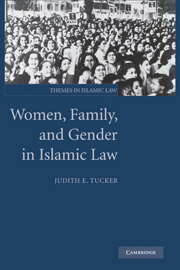Book contents
- Frontmatter
- Contents
- Acknowledgements
- Maps
- 1 Introduction
- 2 Woman as wife and man as husband: making the marital bargain
- 3 Woman and man as divorced: asserting rights
- 4 Woman and man as legal subjects: managing and testifying
- 5 Woman and man in gendered space: submitting
- 6 Conclusion
- Glossary
- Bibliography
- Suggestions for further reading
- Index
4 - Woman and man as legal subjects: managing and testifying
Published online by Cambridge University Press: 05 June 2012
- Frontmatter
- Contents
- Acknowledgements
- Maps
- 1 Introduction
- 2 Woman as wife and man as husband: making the marital bargain
- 3 Woman and man as divorced: asserting rights
- 4 Woman and man as legal subjects: managing and testifying
- 5 Woman and man in gendered space: submitting
- 6 Conclusion
- Glossary
- Bibliography
- Suggestions for further reading
- Index
Summary
The jurists who elaborated Islamic law and the courts which administered that law did not confine their attention, of course, to matters of marriage and divorce but rather ranged over many areas of human existence, from the ritual practices prescribed for devout Muslims to the punishments reserved for those who engaged in criminal activities. The lion's share of most works of fiqh and collections of fatwas, as well as cases in the court system, however, were devoted to subjects that pertain, in some fashion, to property: sales and purchases, rents, business partnerships, waqf endowments, pawns and securities, gifts, and inheritance were all discussed in precise detail. The law thus concerned itself in great measure with how property was to be managed, transferred, and made to yield benefits for its owners, preoccupations very much in keeping with the vital commercial environment of the time and place in which Islam arose.
The legal instrument most essential to property management, the contract, occupied a central place in the Islamic legal system. Undergirded by Qurʾanic exhortations, “consume not your goods/ between you in vanity, except there be/ trading, by your agreeing together” (4:29) and “When you contract a debt/ one upon another for a stated term,/ write it down” (2:282), Islamic jurists developed a sophisticated law of contracts. The right of the individual to manage and dispose of his or her private property by contractual means was recognized and upheld by the law, although somewhat limited, at least in theory, by religious considerations including prohibitions on usury, trade in illicit objects (such as pork or wine), and the attachment of stipulations to a contract that violate ethical or ritual precepts.
- Type
- Chapter
- Information
- Women, Family, and Gender in Islamic Law , pp. 133 - 174Publisher: Cambridge University PressPrint publication year: 2008



